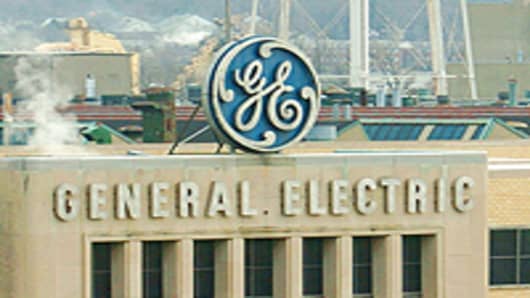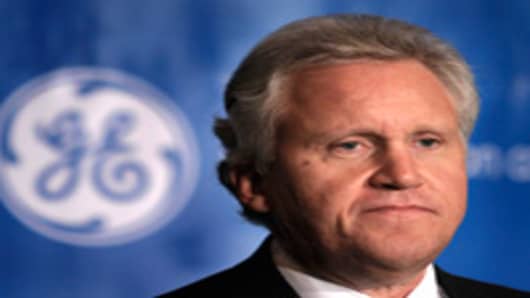General Electric* is reporting quarterly earnings tomorrow, October 15, and investors should get a better picture of the conglomerate's performance.
GE shares have risen 8% over the past year but have been quite volatile, ranging from a 52-week closing high of $19.70 on April 30 to a low of $13.75 on July 2, amid investor concerns about the economy and complicated healthcare and financial reform legislation and credit risk at GE Capital.
On July 23, the company announced it would raise its quarterly dividend from 10 cents to 12 cents a share, which will be paid on Oct. 25. Based on the increased payout, the shares have a forward dividend yield of 2.79%.
With a remarkable $74 billion in cash and equivalents at the end of the second quarter, GE had many options, including redeeming $3 billion in preferred shares that have a 10% coupon, buying back common shares and increasing the dividend.
CEO Jeff Immelt has said previously that the company would look to redeem the preferred shares before raising the dividend on the common, and also said during GE's second-quarter earnings conference call that the company would focus on "good complimentary transactions," and buying back shares.
Examples of complementary transactions include last week's purchase of Dresser and GE Capital's acquisition of a retail credit card portfolio from Citigroup .
Morgan Stanley Research analyst Scott Davis said in a report published Monday that "GE will likely continue to raise the dividend in-line with earnings growth to maintain a payout ratio of 40%."
The company is likely to announce another small increase to the dividend in January, and based on the consensus 2010 full-year earnings estimate of $1.11 a share among analysts polled by Thomson Reuters, a 40% payout ratio would translate to a slight increase in the quarterly dividend to 11 cents a share. A 40% payout of the $1.29 consensus earnings estimate for 2011 would lead to a 13 cent quarterly dividend.
Earnings:
The average estimate among analysts polled by Thomson Reuters is for GE to report third-quarter net income of 27 cents a share, which was also the estimate for the second quarter, and would be a decline from the actual second-quarter income attributable to common shareholders, which was $3 billion or 30 cents a share.
For the third quarter of 2009, net earnings attributable to common shareholders were $2.4 billion or 22 cents a share.
Davis's estimate for third quarter earnings matches the consensus and his "Overweight" or Buy rating on the shares and 12-month target of $22 are unchanged. He expects the company's Energy Infrastructure division to show weakness from "a freefall in wind demand," and strong results from sales of medical products.
Jim Hardesty, president of Hardesty Capital Management in Baltimore, Md., told TheStreet that "the dark night is over" and that he "would be adding to a position right here." His firm has had a significant long-term position in GE's shares.
Hardesty applauds Immelt's movement of the company's profit mix to manufacturing products:
"You're seeing the company derive 46% of revenues from domestic sources and 54% from overseas with an increasing proportion (now 26%) from Asia and growing rapidly."
He views the company as an infrastructure play for emerging markets and went on to point out that most GE executives who receive stock options are holding on to the majority of their positions when they exercise their options, showing confidence in a recovery for the shares.
Revenue:
The average projection among analysts is for third-quarter revenue of $37.7 billion, improving from $37.4 billion the previous quarter but down slightly from $37.8 billion in the third quarter of 2009.
William Blair & Co. analyst Jeffrey Germanotta has a "Market Perform," or hold rating, on the shares. He estimates GE's third-quarter revenue will be $37.6 billion with 5% increase in sales in the Home & Business segment along with slight increases in revenue for the Technology Infrastructure and GE capital being outweighed by declines in revenue for NBC Universal and the Energy Infrastructure segment.
Germanotta said his firm was "becoming incrementally more positive regarding GE as the worst is now past in most business lines and the company should benefit from improving economic activity." Among challenges noted in the William Blair report published Monday was a "temporarily lower energy demand," which would keep utilities from moving forward with wind energy projects.
Hardesty said an example of a long-term manufacturing trend that will benefit the company is producing and then maintaining engines for Boeing's Dreamliner, with the big payoff coming down the line from maintenance. "The initial sale of the engine is like giving the customer the razor and selling them the blades later."
GE Capital:
GE Capital's segment profit last quarter was $830 million, as loan losses and impairment write-downs declined significantly. For the third quarter, Davis estimates GE Capital's profit will be $561 million, compared to $263 million in the third quarter of 2009.
According to GE Capital Credit Card Master Note Trust filings for the month ended August 21, the 30+ day delinquency rate for securitized credit card balances was 5.03%, increasing from 4.88% the previous month.
GE's August 21 delinquency rate exceeded the 4.42% average for August reported by SNL Financial for the commercial banks with major credit card operations, including Citigroup (which actually reports delinquencies of 35 or more days), JPMorgan , Bank of America , Capital One , American Express and Discover .
GE Capital's annualized charge-off (loss) rate for the securitized card portfolio was 8.64% for August, which was slightly lower than the 8.72% average loss rate for the major credit card lending banks, according to SNL Financial. Bank of America had the highest loss rate among the group at 11.73% and American Express the lowest, at 5.45%.
Upcoming Events:
GE said in early August that its pending sale of 51% of NBC Universal* to Comcast was "expected to close within the next six months" and would net the company $6.4 billion in cash. The deal is still subject to regulatory approvals.
Another unknown for the company is just how much regulatory capital GE Capital will be required to maintain, as regulators interpret the Dodd-Frank banking reform legislation and the Basel III agreement.
______________________________
Disclosures:
*General Electric is the parent company of NBC Universal, itself the corporate parent of CNBC.
TheStreet's editorial policy prohibits staff editors, reporters and analysts from holding positions in any individual stocks.



